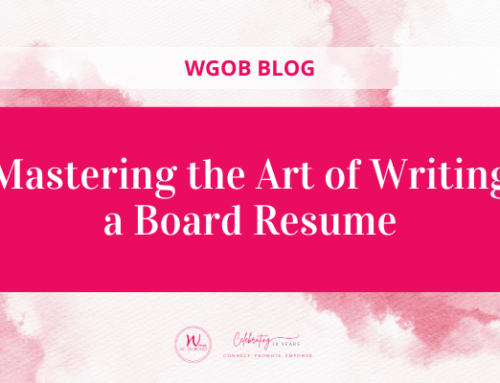Women Get On Board Inc. (WGOB) is a member-based company that connects, promotes and empowers women to corporate boards.
On January 26, WGOB hosted their first Speaker Series virtual event in 2022, sponsored by Blackrock Canada. The panel provided an in-depth explanation of Independent Review Committees (IRCs), explored their unique and essential role in the financial services industry and offered advice for prospective IRC candidates.
Deborah Rosati, FCPA, FCA, ICD.D, Corporate Director & Founder and CEO, kicked off the panel by introducing Eleanor McIntyre, Managing Director, Chief Operating Officer at BlackRock Canada.
To begin the conversation, Eleanor provided an overview of the topic and introduced the panel moderator, Martha Fell. Martha—who is the Chair of the Independent Review Committee at BlackRock Canada —went on to introduce the panel, which included:
- Merle Kriss: Principal at Kriss & Associates Ltd. & Chair, Independent Review Committee at SEI, Canada
- Marcia Lewis Brown: Consultant, Chair, Independent Review Committee at CIBC Asset Management Inc.
This webinar offered participants the opportunity to learn about IRCs and discover opportunities to get involved in them in the future. Even for those in the financial services industry, IRCs are not commonly known about or understood. But for board-ready Canadians, IRCs may be an excellent opportunity to join a corporate board-like body that serves a unique purpose.
What are IRCs?
If you are unsure what IRCs do, you are not alone. At the beginning of the webinar, Martha candidly shared that when she was first offered an opportunity to join one, she had to look up the term to refresh her understanding of their role in relation to fund managers and regulators.
“IRCs, in the simplest terms, are intended to enhance investor protection,” said Martha.
Improving fund governance has been a priority for Canadian securities regulators since the 1990s. But it wasn’t until 2002 that the CSA released a vision for a renewed framework for regulating mutual funds and fund managers and, after public consultation, published the final version of the regulations that came into force in 2007. The framework mandated that Independent Review Committees be established to impose a consistent standard of independent oversight for publicly offered investment funds in the jurisdictions governed by the Canadian Securities Administrators.
IRCs protect investors by evaluating conflict of interest. But what does that mean?
A conflict is any situation in which a fund manager may have an interest that might conflict with the manager’s ability to act in good faith and in the best interests of the fund unitholders. The conflicts relate to actions that can occur in the manager’s normal course of business.
A list of potential manager conflicts is laid out in a document referred to as NI (National Instrument) 81-107.
Typically, policies are already in place to govern the funds, so IRCs are mandated to evaluate each situation according to the existing regulations to determine if the conflict violates those policies. The IRCs review each conflict against the policies and report to the provincial securities commission when a major breach is identified.
When a conflict arises, the fund manager is required to present it to the IRC, which must then evaluate the conflict of interest, including the fund manager’s proposed solution, before the fund can move forward. IRCs receive information solely from management, and they are expected to communicate their findings to regulators if a reportable breach occurs.
What are the responsibilities of an IRC?
Essentially, an IRC’s role is to monitor conflicts of interest for the regulators. IRCs provide independent oversight and impartial judgment on all decisions involving a conflict of interest faced by the fund manager to ensure that funds are operating in the interests of fund investors and not in the interests of fund managers.
Merle explained that since IRCs were implemented in 2007, fund managers have grown to appreciate their role. Most have realized that the committees save their firms time and resources, as they are no longer required to go to the securities commission to handle conflicts on a case-by-case basis.
“Fund managers have moved from apprehension to acceptance to enthusiasm,” said Merle. She added that regulators appreciate IRCs for similar reasons—they save them time and energy evaluating conflicts individually.
What are the differences between an IRC and the company’s board?
Although both IRCs and company boards oversee a firm’s activities, they have significant differences. Primarily, the board is responsible for evaluating various issues, whereas the IRC exists specifically to assess conflicts.
“The IRC has quite a narrow and specific role,” explained Marcia.
IRCs are typically smaller than boards, with just 3 – 7 members, and do not use subcommittees in their activities. However, they do rely on management input, just like a board.
How can you seek out opportunities to serve on IRCs?
With a growing demand for IRC members, plenty of opportunities are available for board-ready women who are prepared to take on the challenge. Marcia and Merle both offered advice for women seeking opportunities on IRCs.
First, Merle suggested doing your research online. As she pointed out, everything related to IRCs is in the public domain, so you can look up a fund manager’s IRC Report to Unitholders to learn who is on the committee, how long they have been on the IRC, and what the compensation of the position is currently. If you look up an IRC and notice a member who has been serving for a decade or more, there is likely to be an opportunity available in the near future.
“You’ll be surprised by how much you can learn without leaving your desk,” said Merle.
Next, she recommends making contact. Reach out to the Chair or other members of the IRC and inquire about possible turnover. Using your network to reach out can be helpful but isn’t necessary to be successful.
As for qualifications, IRCs accept a wide range of skill sets. However, they are particularly interested in expertise in the financial services industry—fund management, risk management, law, alternative investment and other unique technical or financial experience.
“Part of it is timing,” said Marcia. “If they are looking for somebody with your combination of skills, then you’re in luck.”
Of course, IRC members themselves must be independent and have zero possible personal conflicts with the fund company, its suppliers or any related entities. Personal conflicts with the fund manager—such as a large shareholding, a relative employed by the fund manager or a large loan from the sponsor of the manager (typically a bank)—might impair an IRC member’s objectivity. IRC members must regularly attest to their independence, and IRCs are responsible for evaluating the independence of their colleagues.
Martha added that it is unnecessary to have a C-suite role on your resume to be a suitable candidate. On IRCs, qualification comes down to your experience and competencies.
The panel members agreed that if you work well with others, you’re an independent thinker, and you know how to ask the tough questions, you have a great shot at landing a seat on your first IRC.
Are you interested in learning more about effective boards and governance? Join us for our next WGOB Speaker Series on February 15, called “Building a strong and diverse board before you go public.” Sponsored by irlabs, you’ll learn why a Canadian company recently went public on the TSX-V with an all-women board and C-suite, as well as how boards can better support diversity. Register here.






